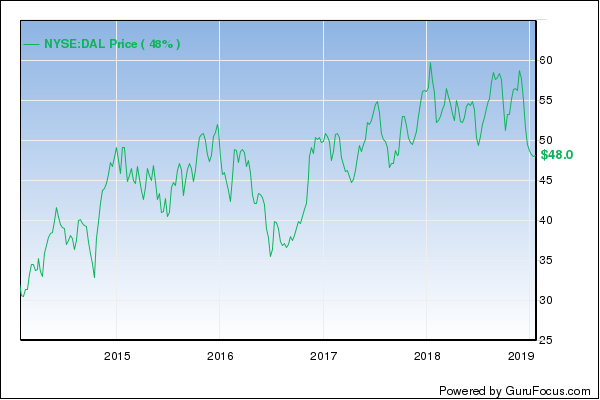Warren Buffett on Airlines
- By Rupert Hargreaves
When, in 2016, it was revealed that Warren Buffett (Trades, Portfolio)'s Berkshire Hathaway (NYSE:BRK.A)(NYSE:BRK.B) had started buying airline stocks in large volumes, Buffett watchers (and the rest of Wall Street) was caught by surprise.
Warning! GuruFocus has detected 7 Warning Signs with AAPL. Click here to check it out.
The intrinsic value of BRK.A
Of all the companies out there, few have attracted as much negative attention from Buffett as airlines.
However, it looks as if Buffett has now gotten over his hatred of the industry. In several interviews given since, he has stated that he believes the airline industry has changed fundamentally over the years, which is why, after avoiding it for so long, he's now prepared to bet on the sector with billions of dollars.
From hated sector to ideal cash cow
One of Buffett's few losing investments over the years was the preferred stock of USAir, which he wrote about in his 1996 letter to shareholders of Berkshire Hathaway:
"When Richard Branson, the wealthy owner of Virgin Atlantic Airways, was asked how to become a millionaire, he had a quick answer: 'There's really nothing to it. Start as a billionaire and then buy an airline.' Unwilling to accept Branson's proposition on faith, your Chairman decided in 1989 to test it by investing $358 million in a 9.25% preferred stock of USAir.
I liked and admired Ed Colodny, the company's then-CEO, and I still do. But my analysis of USAir's business was both superficial and wrong. I was so beguiled by the company's long history of profitable operations, and by the protection that ownership of a senior security seemingly offered me, that I overlooked the crucial point: USAir's revenues would increasingly feel the effects of an unregulated, fiercely-competitive market whereas its cost structure was a holdover from the days when regulation protected profits. These costs, if left unchecked, portended disaster, however reassuring the airline's past record might be.
....
In another context, a friend once asked me: 'If you're so rich, why aren't you smart?' After reviewing my sorry performance with USAir, you may conclude he had a point."
The reason why airlines have been such disastrous investments is their "insatiable" demand for capital, according to Buffett, who wrote the following in 2007:
"The airline industry's demand for capital ever since that first flight has been insatiable. Investors have poured money into a bottomless pit, attracted by growth when they should have been repelled by it. And I, to my shame, participated in this foolishness when I had Berkshire buy U.S. Air preferred stock in 1989. As the ink was drying on our check, the company went into a tailspin, and before long our preferred dividend was no longer being paid. But we then got very lucky. In one of the recurrent, but always misguided, bursts of optimism for airlines, we were actually able to sell our shares in 1998 for a hefty gain. In the decade following our sale, the company went bankrupt. Twice. To sum up, think of three types of 'savings accounts.' The great one pays an extraordinarily high interest rate that will rise as the years pass. The good one pays an attractive rate of interest that will be earned also on deposits that are added. Finally, the gruesome account both pays an inadequate interest rate and requires you to keep adding money at those disappointing returns."
These two quotes (there are more) sum up Buffett's previous view of the sector. Airlines were, in his opinion, capital intensive, low margin, highly competitive businesses, precisely the opposite of what he wanted to buy. The question is, what changed?
Buffett shared some thoughts on airlines in a CNBC interview in February of 2017:
"It's true that the airlines had a bad 20th century. They're like the Chicago Cubs. And they got that bad century out of the way, I hope...The hope is they will keep orders in reasonable relationship to potential demand."
I do not claim to be able to read Buffett's thoughts, so I do not know exactly why he changed his mind, but over the past decade, the airline industry has changed dramatically.
There is more financial restraint among carriers, big data has helped improve efficiencies, planes are more efficient and relations with unions are better, all of which has combined to make a better operating environment. Case and point are Delta's (DAL) recent full-year 2017 earnings. Delta generated $6.8 billion of adjusted operating cash flow and $2 billion of free cash flow for the full year. The industry has gone from being a black hole for capital to a cash cow.
Disclosure: The author owns no stocks mentioned.
This article first appeared on GuruFocus.
Warning! GuruFocus has detected 7 Warning Signs with AAPL. Click here to check it out.
The intrinsic value of BRK.A

